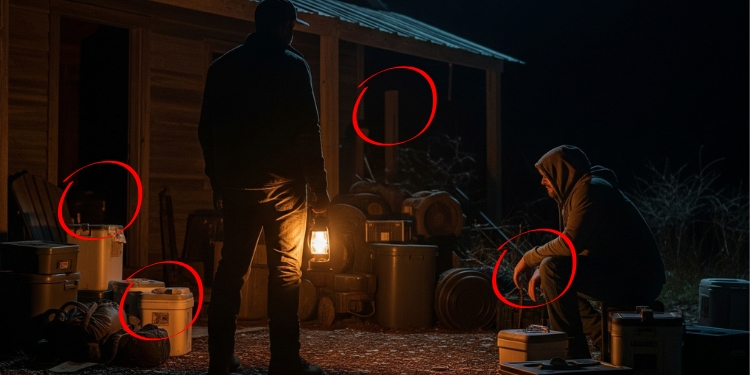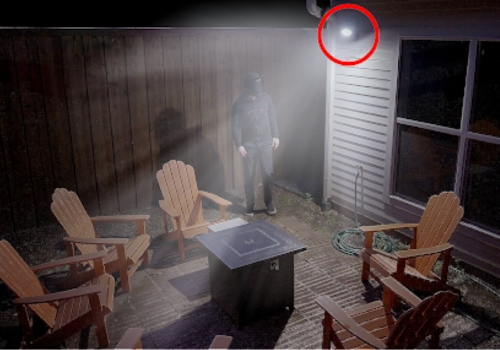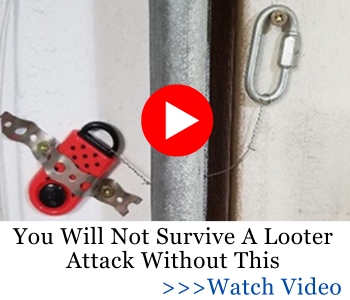You Caught a Looter on Your Property. Now What?

SHTF scenarios often lead to overwhelmed or collapsed law enforcement, giving freedom to criminals and looters, who exploit the situation to their advantage. Whether you plan to bug out or bug in, the possibility of looters coming to your property must be considered. In a SHTF scenario like this, you may find that you caught a looter on your property. You haven’t detained them yet, but you need to decide quickly. Now what?
First, you need to survey the situation and the likelihood of law enforcement returning. This will help you determine the scope of freedom you have to act. During Hurricane Katrina, law enforcement was overwhelmed but present, unlike in Yugoslavia in the 1990s where it completely collapsed. Simply, you must determine if law enforcement is gone for the short-term or long-term.
Short-Term
In the short-term absence of law enforcement, you will eventually be held accountable for your actions, so you should act according to the law. This means avoiding violence towards the looter, except in self-defense or according to your state laws. A citizen’s arrest comes with its own set of regulations and must be performed only under specific conditions. While natural disasters often afford citizens additional discretion in the absence of formal law enforcement, you may still be held liable for injuries, false imprisonment, assault, and other legal risks when order is restored.

Long-Term
In the long-term absence of law enforcement, the situation becomes more complex. Depending on the severity of the SHTF scenario, international bodies may have also dissolved. In this case, moral, religious, and practical considerations can guide your judgment. Even if you are not religious, it is worth considering these beliefs because they will play into the bigger picture.
Religious Considerations
Christian beliefs sometimes advocate using force when necessary to restore peace and order but generally emphasize forgiveness, mercy, and conflict avoidance. While there is no prescribed punishment for looting in Christian teachings, nonviolent solutions should be sought, even if they are more resource and time intensive.
Islamic beliefs stress the importance of justice and community protection. Sharia law often guides Islamic actions and includes predetermined punishments for various crimes. Although schools of thought vary, a traditional (though rarely enforced) punishment for looting is the amputation of the thief’s hand. Specific conditions must be met to rule out looters who are only trying to survive, and the sentence is ordered by a religious court, not the victim.
Judaism values life above almost all other religious rules. While one life may be taken to protect another or your property, more nonviolent solutions are desired. If de-escalation is possible, an effort should be made to do it. If violence against you is likely and you fear for your safety, Jewish teachings emphasize taking the initiative and preemptively striking down the threat. In the absence of imminent harm, Jewish teachings emphasize restorative justice and making amends for the crimes in the pursuit of reconciliation.
Buddhism emphasizes nonviolence and the minimization of harm. Seeking peaceful solutions would be paramount. Creating dialogue, extending compassion, and striving for peaceful conflict resolution are critical.
Moral and Ethical Considerations
Many prevailing morals and ethics in the US are rooted in Judeo-Christian beliefs, but morality is not limited to religion. Practicality and balance are also important. Actions taken in defense should be proportional to the threat, and violence should be reserved as a response to violent behavior.
There is a fine line between self-defense, including home defense which you can learn everything about from here, and vigilantism. Self-defense is a right reserved by everyone, but it is very limited in its application. There must be an imminent threat of harm to oneself or another, and the response to the threat should be proportional to the threat itself.

Vigilantism is taking law enforcement into your own hands, often through preemptive strikes, punishments, and retribution. It often conflicts with established rules of law and leads to cycles of revenge and retribution.
Prevention is Essential
Ideally, you shouldn’t have to deal with moral dilemmas. That’s because in a perfect world, there wouldn’t be any looters showing up on your property. Unfortunately, real life tells a different story, and your home could be “visited” by uninvited guests at any moment.
The good news? You can take action to reduce the chances of that happening. My recommendation is to start by investing in this complete anti-looter kit, which can help discourage people who might be thinking about turning into looters.
I’ve already installed the kit at home and was impressed especially by how easy it was to set up. Also, the fake camera with LED floodlight looks incredibly realistic. Hell, sometimes even I forget it’s fake.
👉 There are only a few kits left at the discounted price. Grab yours while you still can!
Practical Considerations
Several practical factors can influence how you deal with looters in these situations. These largely boil down to a strengths and weaknesses assessment. How vulnerable you are to harm, both immediately and in the near future, and how capable you are of dealing with the threat. Wide-spread looting may see individual or small groups of looters roaming around searching for their next score. It can also see the creation of large organizations with hundreds of people.
For example, the Capitol Hill Autonomous Zone (CHAZ) was created in 2020 by protesters in Portland, Oregon. It was created in the face of existing law enforcement, gathered hundreds to thousands of supporters, was self-governed, and there were widespread reports of crime. Like-minded individuals often band together to create larger groups with similar goals, meaning the looter you encounter may be part of a larger group that will come looking when the looter is noticed as missing. How well-armed and organized they are can make a significant difference in the eventual outcome.
Similarly, you must assess your strengths and weaknesses. Do you have resources to spare, enough firepower to fight back, the ability to effectively detain the looter, or should you avoid confrontation?
What Does All This Mean?
Laws and order deeply influence human society, providing protection and safety. Even when national law enforcement collapses, communities tend to form new legal systems. Whether you are part of the new creation or not, you will likely come under their imposed jurisdiction and be subjected to the laws they establish. These laws will likely be based on prior laws, religion, morals, and ethics. The actions you take in the absence of formal law enforcement may be retroactively punished under the new system.
An example of this is the Nuremberg Trials after World War Two. Within Nazi Germany, the Holocaust was legal based on the laws and policies of the country. Those committing the atrocities were following the national law, but their actions were high crimes against humanity according to international law, and they were retroactively punished for it after the war when the Nazi authority was replaced by Western and Soviet authorities.

The moral of this tidbit is not to defend the Nazis but to illustrate that the actions you take under one set of rules may not be the set of rules you are judged on later when a new authority takes over. Make no mistake: a new authority will always take over. Your actions with looters in the absence of law enforcement should be in line with established human rights and future-proofed to be within the likely morals and ethics that a new authority could have.
So, What Should You Do with the Looter?
Now, we are back to the initial question. With some ethical considerations in mind, practical solutions are needed. Immediate violence may be necessary, but you can likely start with non-lethal options and escalate when needed.
Alert and Deter
Looters are often creatures of opportunity who look for easy gains without much risk to themselves. Simply letting them know they have been discovered may be enough to get them to go away. You could set off your car alarm or shine a bright light at them to make them feel exposed. Even if you are alone, yelling an alert to “others” within your home can give the impression that you are a larger force for the looter to deal with.
Clear Communication
If the alert is not enough to cause them to scurry off, communicate to them from a safe part of your property where you have shelter from any offensive weapons they may have. Firmly tell them to leave. Communicate that you are armed and will defend your property.
Negotiate
If the looter insists on taking something or refuses to leave, consider negotiating. Whether the looter is opportunistic or part of a larger organization, they will be looking for something of value. You may have the possibility to trade something in exchange for them leaving and not returning. They might be in a desperate situation and in urgent need of food or medicine.
Click here to find out an ingenious way to stockpile prescription medicines, including insulin. These could turn out to be life-saving, even when you have the chance to solve a crisis through bartering. Be careful not to reveal the extent of your resources, which could encourage them to return later.
Retreat and Fortify Your Property
With some preparation, your property could be fortified enough to fend off forced entry attempts. If negotiations fail, you may need to defend against their attacks. You know your property better than they do, so you will have the advantage.
If attacked, you should fight back with enough intensity that they change their mind and retreat. If they do not retreat, you will have to carry through until the threat is neutralized. This is a clearly offensive and violent action they are taking against you, meaning you will most likely be justified in defending yourself lethally.
Capture the Looter
If you can safely do so, capturing the looter could be a valuable source of information. Any SHTF scenario where society and formal institutions have collapsed will likely be accompanied by a great lack of situational awareness. Try to learn about their motives, any larger organization they are part of, the status of the local area, etc.
Great care and caution must be taken if you capture a looter. They will need to be kept in a secure room, bound, and watched carefully. You will also become responsible for their welfare while they are detained. Keep their eyes covered so they cannot see your face or the contents of your property. Detaining a looter should be avoided because it brings a threat into your home and increases the chances of future hostilities. If you do, you must have a clear plan to safely release them.
Ally with the Looter
It may seem counterintuitive to ally with looters, but it is a possible solution that does not mean you have to be complicit in the crime. It could be as simple as an ideological alliance. At the very least, you could establish a non-aggression pact that buys you time to prepare and build your own faction of supporters while remaining out of the crosshairs of looters.
One Last Thing
 As you can see, there are many ways to deal with a looter caught on your property. I’ve shared several perspectives and tried to give you as many options as possible – but here’s one final piece of advice: take a close look at what Joel Lambert, a survival expert and former Navy SEAL, has to say on the matter in his A Navy SEAL’s Bug-In Guide. Discover:
As you can see, there are many ways to deal with a looter caught on your property. I’ve shared several perspectives and tried to give you as many options as possible – but here’s one final piece of advice: take a close look at what Joel Lambert, a survival expert and former Navy SEAL, has to say on the matter in his A Navy SEAL’s Bug-In Guide. Discover:
- Ingenious, Violence-Free Ways to Keep Looters off Your Property
- How to Know if Your Neighbor Will Become a Looter in the Next Crisis
- How to Safely Clear Your House Room to Room When You Think You’ve Got an Intruder
- The Most Common Security Mistakes You’re Probably Guilty of Too
And if you’re ready to take things even further – planning for the moment when looters might break through your first line of defense – you also need to know where to hide your most valuable supplies. In the same guide, you’ll learn:
- What Hiding Places Looters Never Check
- How to Silence a Conventional Generator so It Doesn’t Draw Unwanted Attention
- SEAL Home Survival Tactics
Final Thoughts
Encountering a looter on your property can be a simple interaction where they are driven off fairly easily. It can also escalate dramatically and become violent. Your response to looters should be driven by the necessity of the situation with consideration to the future implications it will have for you and your family.
By having a predetermined plan for how to deal with looters, you will be able to act faster and more efficiently when the time comes. What is your advice for dealing with a looter in a SHTF scenario? Add to the discussion below!
__________________________________________________________________
This backpack-sized water generator could save your life. It produces up to 40 gallons of safe drinking water per day – perfect for survival, cooking, or bartering.
You may also like:

Looter Deterrents You Never Thought Of
How To Build The Invisible Root Cellar (Video)
8 Signs Looters Are Casing Your Property
5 Types of Looters and How to Outsmart Them
How to Tell If You’re an Easy Looter Target
Read the full article here








